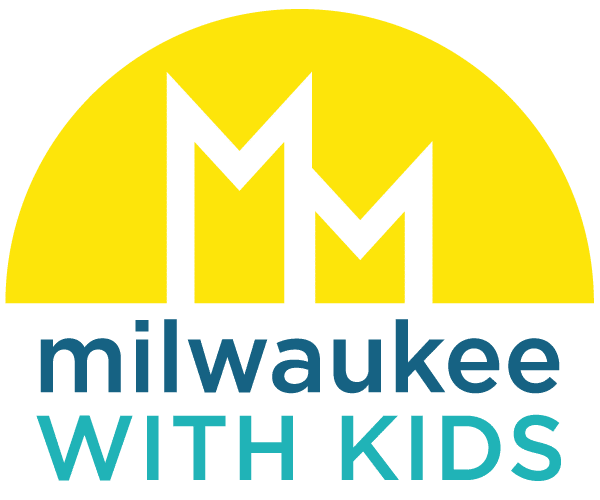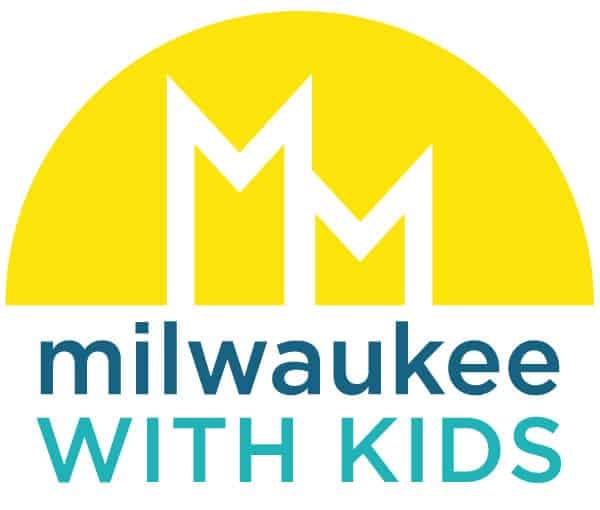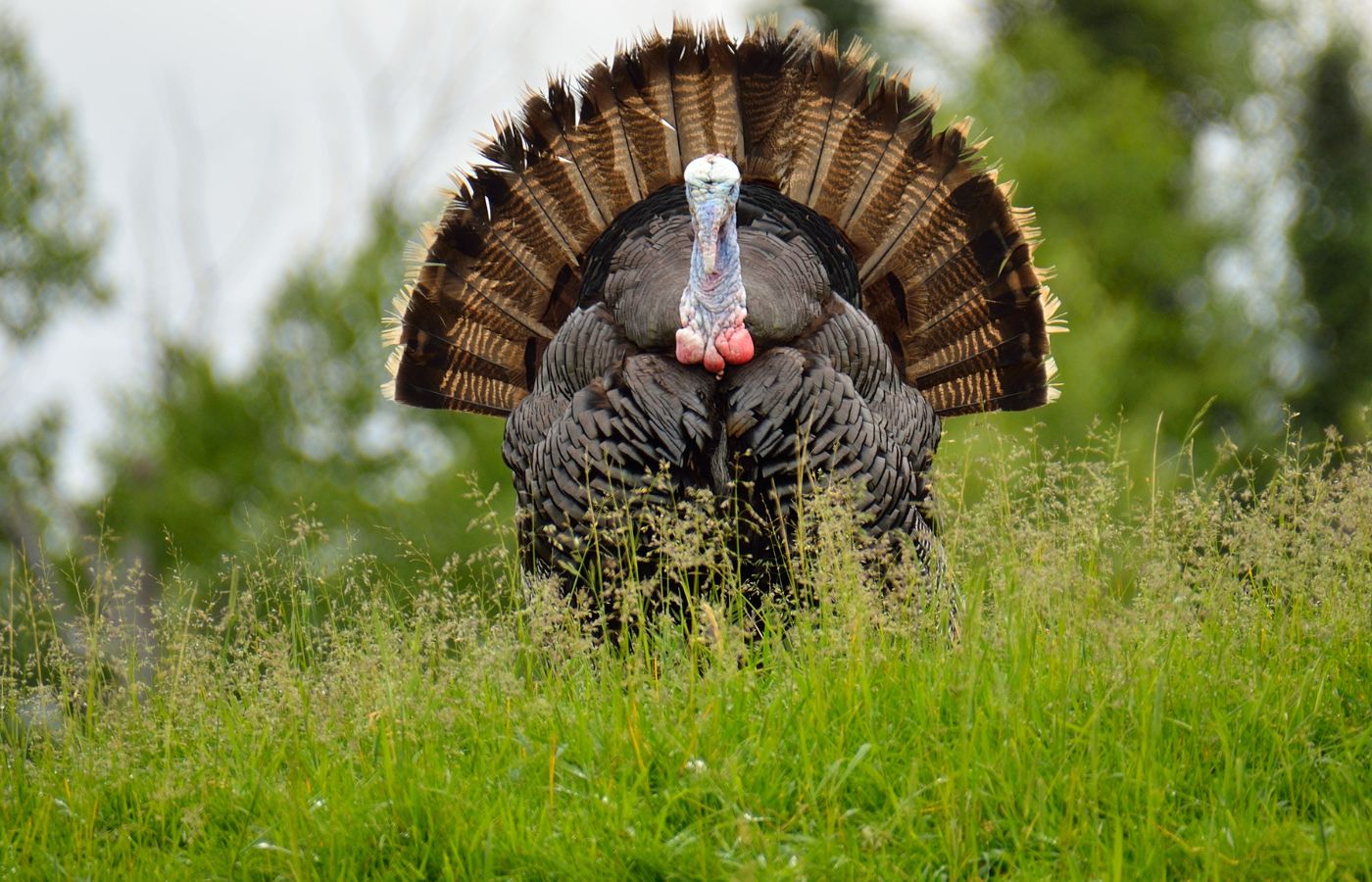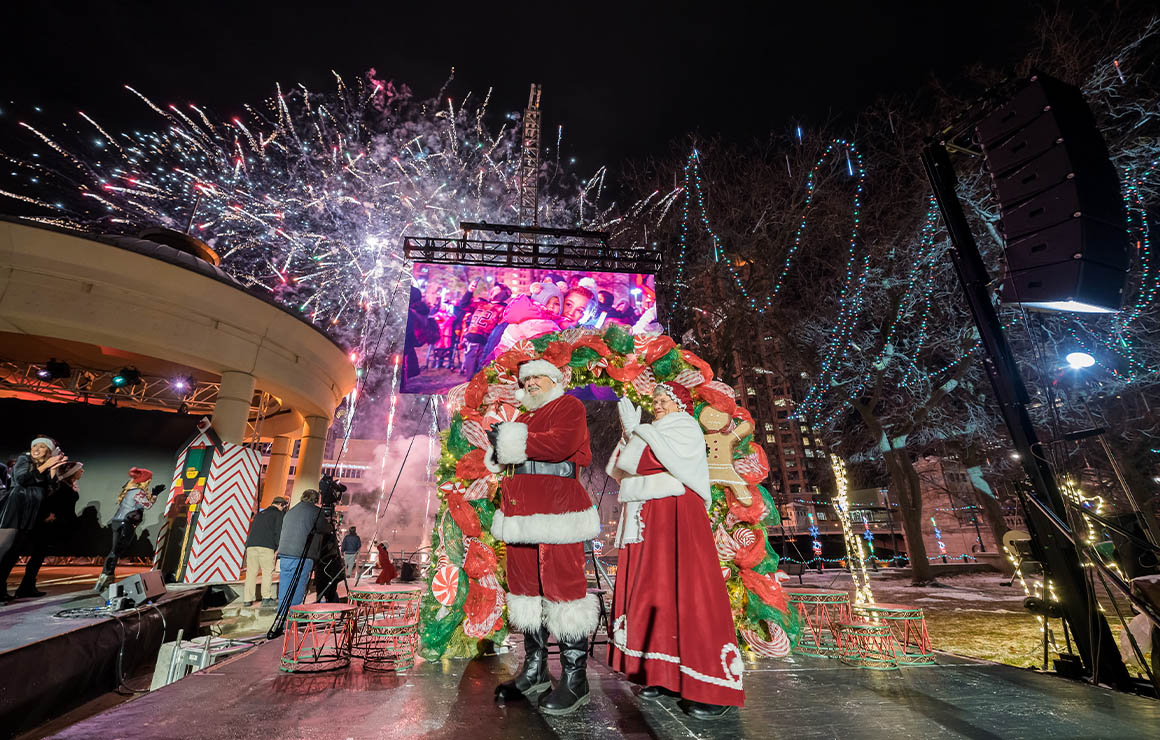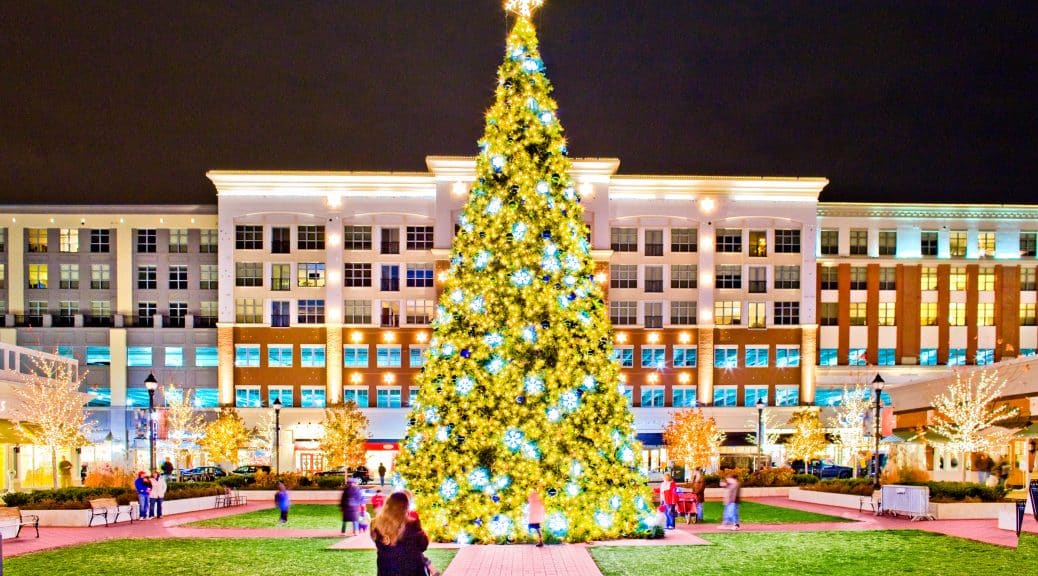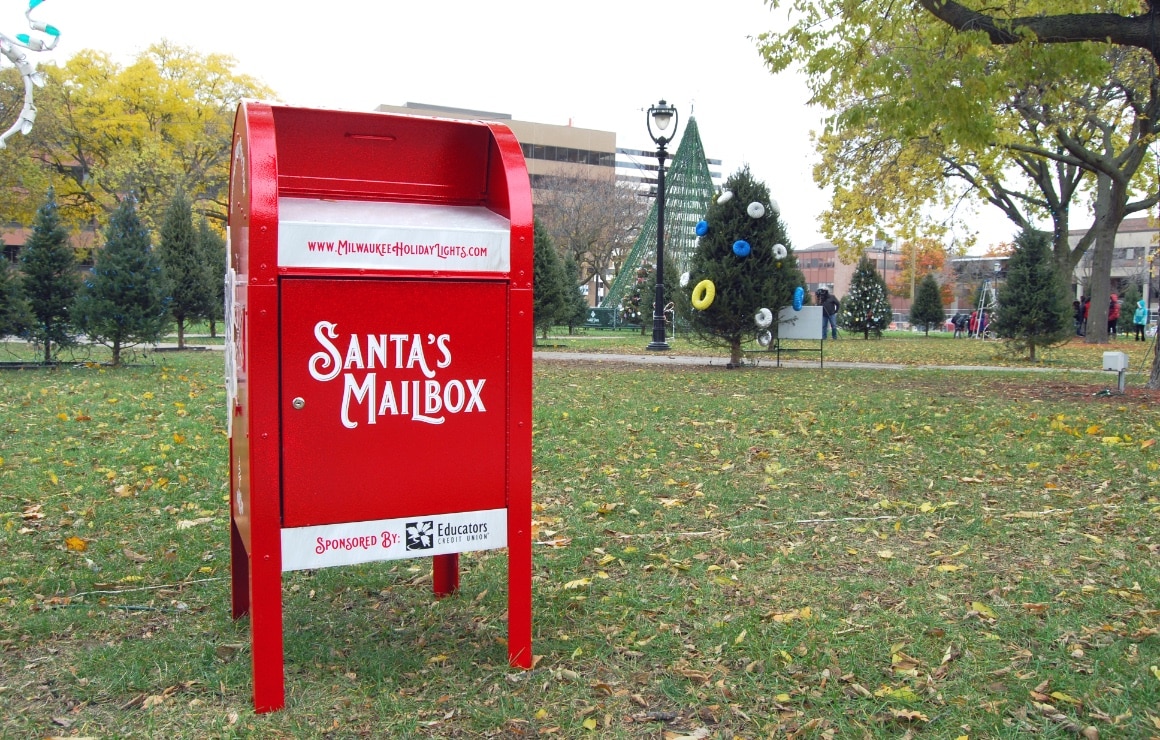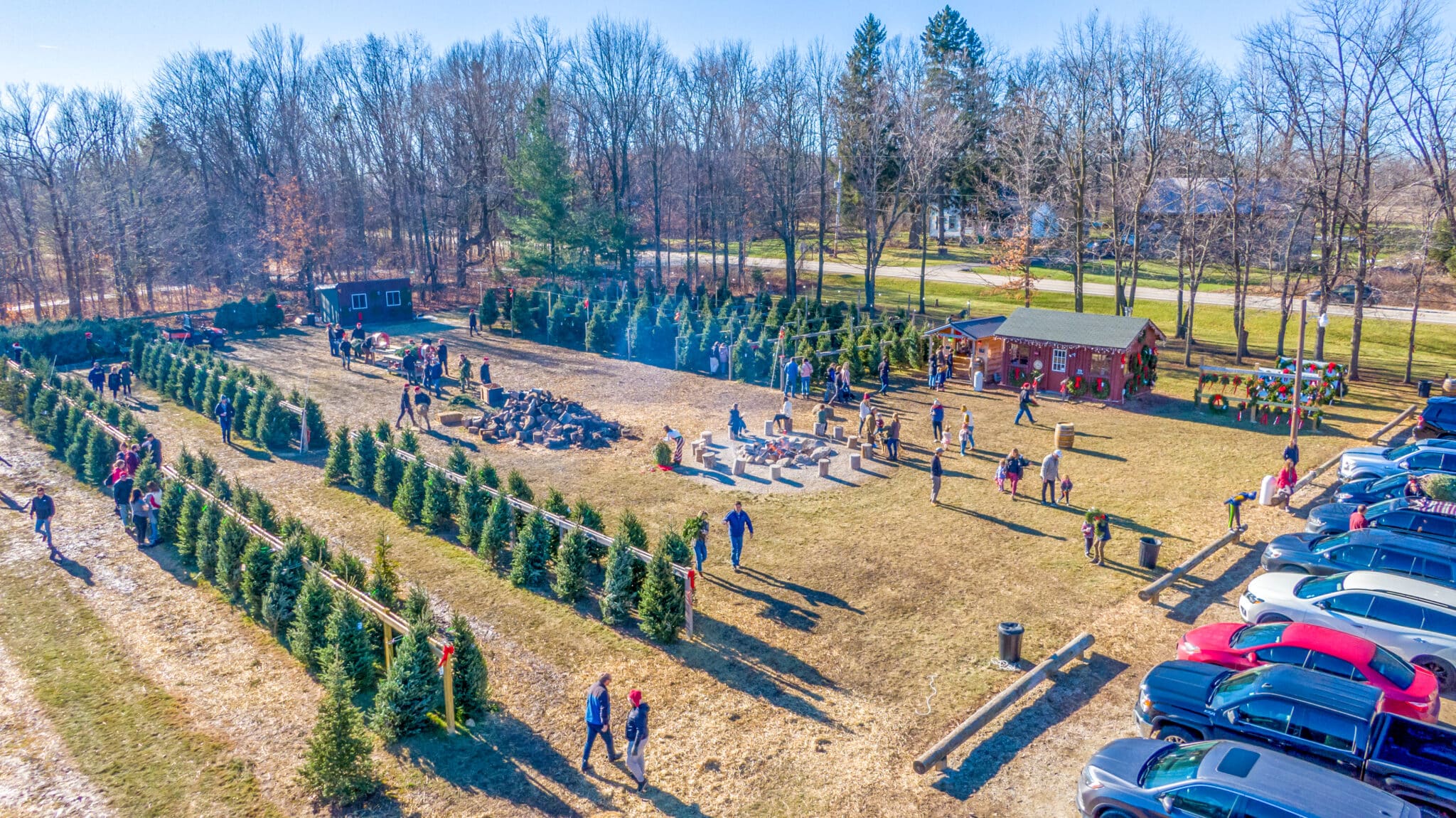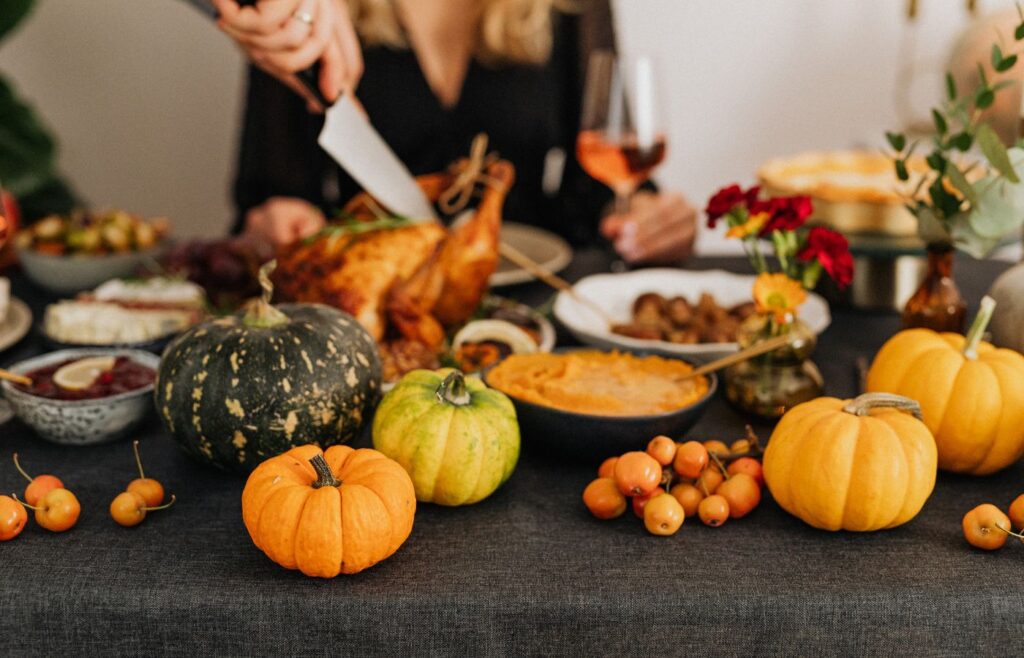
More than four hundred years ago, 101 English settlers arrived at what is now Cape Cod, Massachusetts, where the Wampanoag people had lived for over 12,000 years.
Together they celebrated the harvest in what is now known as the First Thanksgiving.
Today, Americans celebrate on the last Thursday of November with turkey, stuffing, sweet potatoes, pumpkin pie and football.
But there’s so much more to know about this holiday that you may have never heard before!
We found 50 fun Thanksgiving facts that everyone at your table will love.
50 Facts About the First Thanksgiving
1. The first Thanksgiving lasted for three days.
The first Thanksgiving was celebrated in Plymouth, Massachusettes in 1621 over a three day period. There was feasting, games, and military exercises. How long does your Thanksgiving last?
2. The first Thanksgiving did not happen on the fourth Thursday of November.
It likely occurred in late September or October as a harvest celebration.
3. There were about 150 guests at the first Thanksgiving.
The first Thanksgiving feast included about 50 Pilgrims who had just arrived in this “new world” – including about 25 children – and about 90 Wampanoag Indians.
How many guests are you expecting this year?
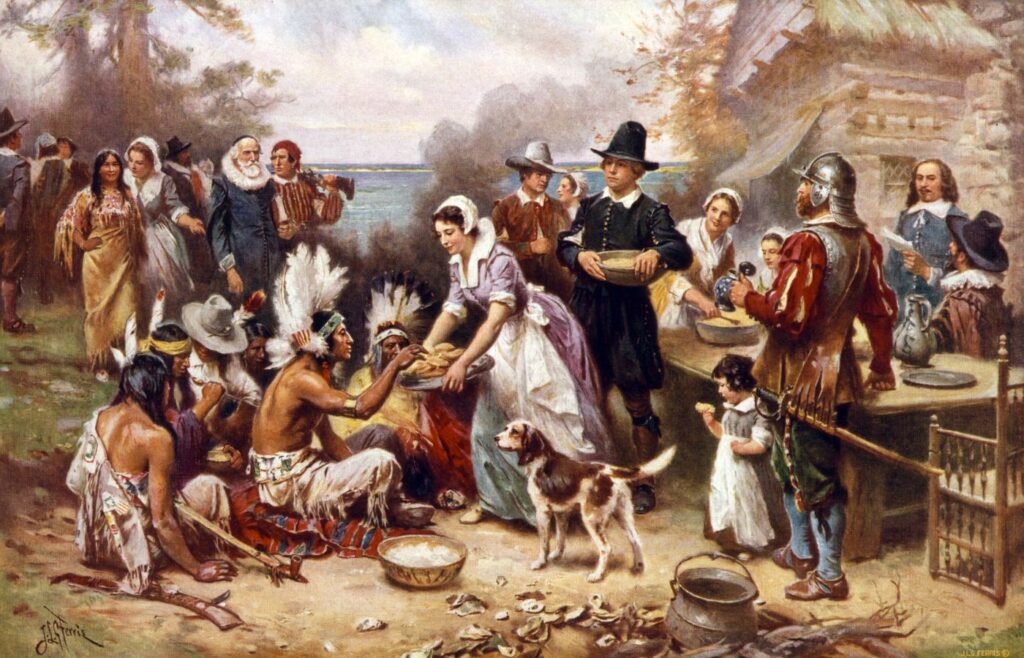
4. There were almost no women at the first Thanksgiving (because they had perished).
Seventy-eight percent of the women who had traveled on the Mayflower perished during the first winter in their new home, so there were only four women at the first Thanksgiving. It’s likely that children, servants, and unmarried men helped prepare the feast.
5. The “first Thanksgiving” may not have actually been the first.
Sixty years before the “first” Thanksgiving in Plymouth, a Spanish ship arrived in Florida and the explorers shared a festive meal with the native Timucuan people. It was 1565.
6. There’s no record of a big giant turkey at the first Thanksgiving.
Turkey may have been on the menu, but seafood would have been the main course at the first Thanksgiving. It’s also likely that other birds were eaten, such as ducks, geese and swans.
Other differences:
Instead of bread stuffing, they probably used herbs, onions or nuts for extra flavor.
The corn was probably served as a corn much or porridge, sometimes sweetened with molasses.
Local vegetables that likely appeared on the table include onions, beans, lettuce, spinach, cabbage, carrots and perhaps peas.
7. The Wampanoag Indians arrived at the first Thanksgiving with an offering of five deer.
(What are you bringing for Thanksgiving this year?)
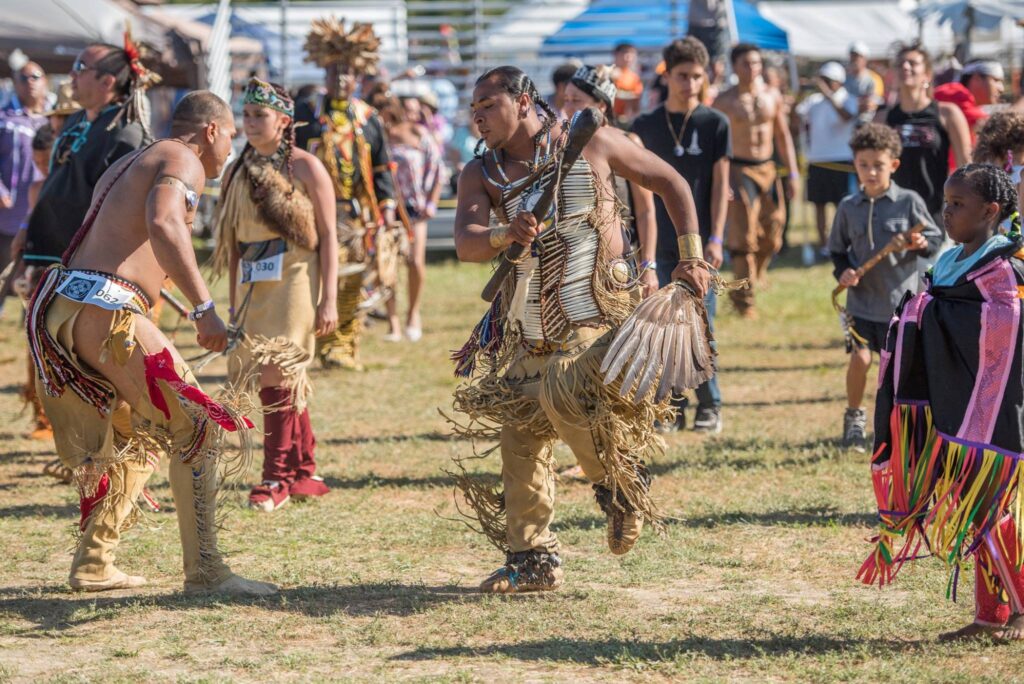
8. Native Americans used cranberries for dye.
Indigenous Americans used fresh cranberries in their food, but they also used them to heal wounds and dye fabrics.
Though cranberries were likely served as garnishes at the first Thanksgiving, the Pilgrims were well out of sugar that year, so there was no cranberry sauce.
Marcus Urann canned the first jellied cranberry sauce in 1912, and went on to become the founder of Ocean Spray.
9. Seafood was the main course of the first Thanksgiving.
Culinary historians believe that much of the Thanksgiving meal consisted of seafood, which is often absent from today’s menus. Mussels in particular were abundant in New England.
10. There were no potatoes at the first Thanksgiving.
Potatoes had no place at the first Thanksgiving in any form. The Spanish had introduced the Europeans to them in the 1500’s, but they weren’t popular enough to make the trip to North America.
11. There was no pumpkin pie at the first Thanksgiving.
They definitely ate pumpkins and squash, but the colony didn’t have the butter and wheat flour necessary to make the delicious pumpkin pie we enjoy today.
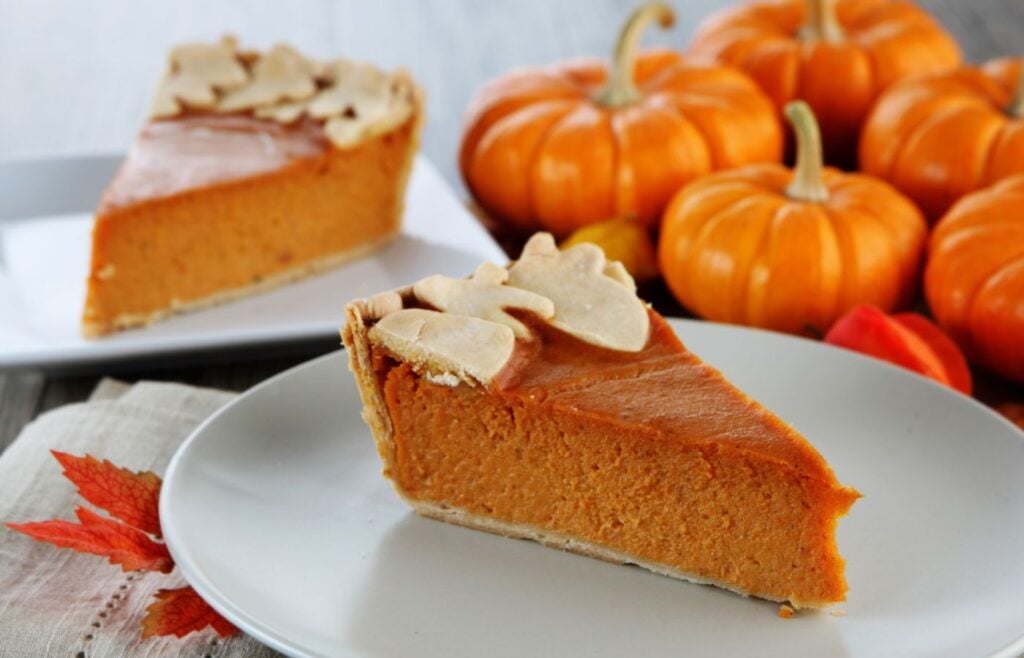
12. Sarah Josepha Hale, the “Mother of Thanksgiving”, also wrote “Mary Had a Little Lamb”.
In 1789, President George Washington called for a national day of Thanksgiving the last Thursday in November to commemorate the end of the Revolutionary War and the ratification of the constitution.
Decades later, Sarah Josepha Hale, abolitionist and author of “Mary had a Little Lamb” passionately lobbied to make Thanksgiving a national holiday. She wrote letters to the president for 17 years.
Finally, President Abraham Lincoln proclaimed Thanksgiving a national holiday on October 3, 1863, in part as an attempt to heal a divided nation.
13. Harry Truman was the first President to receive a ceremonial turkey.
The tradition of U.S. presidents receiving turkeys as gifts goes back to the 1800’s, but President Truman was the first to receive one from the Poultry and Egg National Board and the National Turkey Federation in 1947.
It may have been a peace offering. Shortly before this, egg growers sent crates of live chickens to the White House and labeled them “Hens for Harry.” It was an act of protest against the president’s encouragement of “poultry-less Thursdays.”
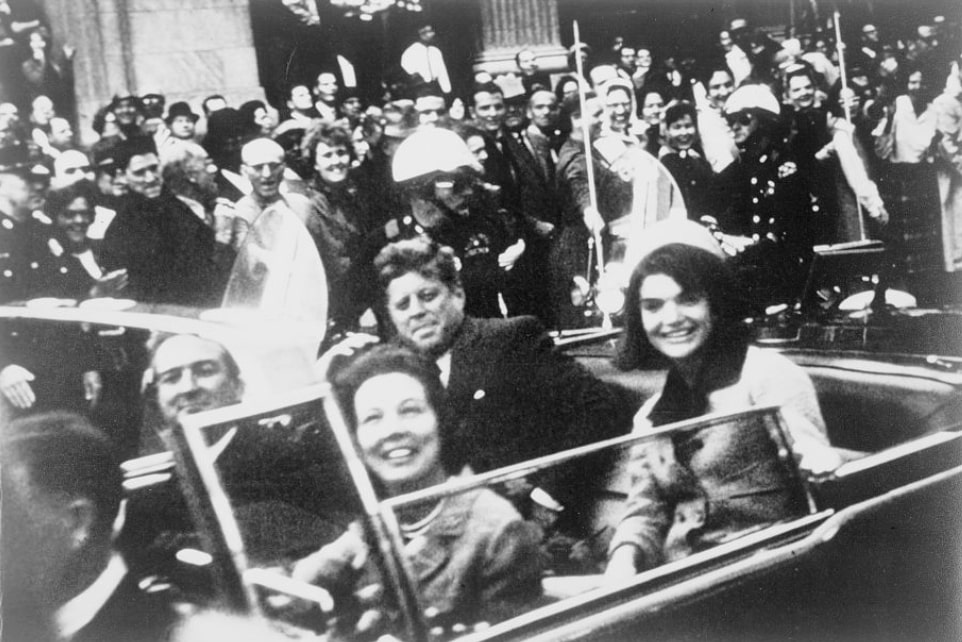
14. President John F. Kennedy was the first to let a Thanksgiving turkey go.
John F. Kennedy was the first to publicly spare a turkey given to the White House on November 19, 1963, just three days before he was assassinated. The turkey was wearing a sign that said, “Good Eatin’ Mr. President.”
Others say that the first president to unofficially pardon a turkey was Abraham Lincoln. Lincoln’s son loved the live turkey they had been given, and Lincoln himself was an animal lover.
15. Richard Nixon sent his turkey to a petting zoo.
16. George H.W. Bush is the president who formalized the turkey pardoning tradition in 1989.
But the turkeys likely don’t live long past their pardon. The National Turkey Federation, which raises birds for the presidential pardon ceremony, says a pardoned bird will generally live up to two years beyond their pardon.
17. You can live in a town called Turkey.
There are three towns in the United States named “Turkey.” They can be found in Texas, Louisiana, and North Carolina.
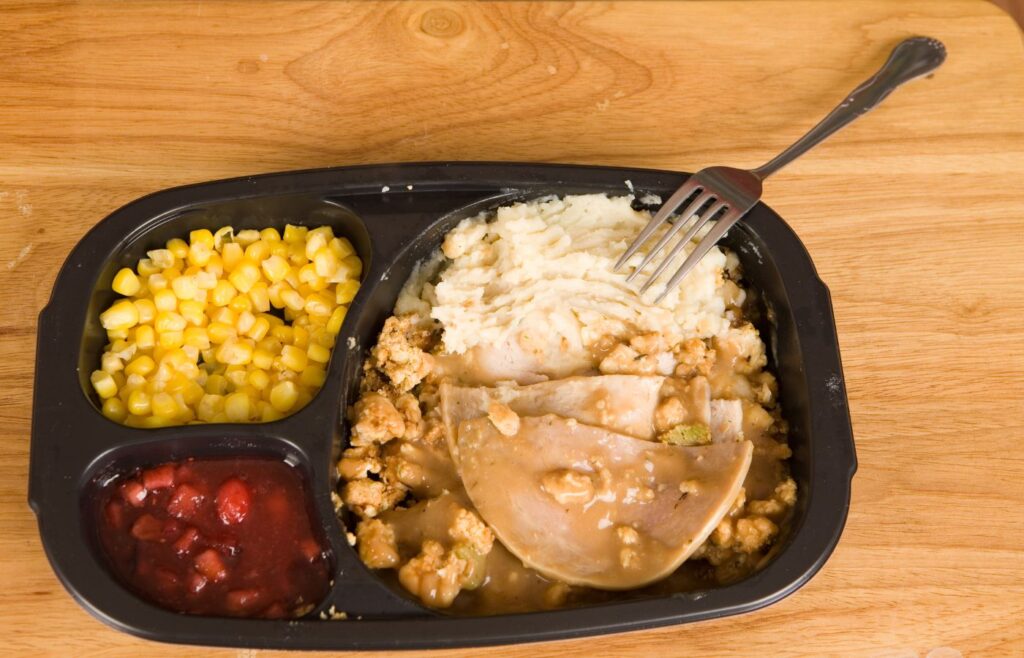
18. A botched Thanksgiving order led to the TV Tray Dinner.
In 1953, C.A. Swanson & Sons overestimated the demand for Thanksgiving turkey, and were left with 260 tons of leftover frozen turkey. So they ordered 5,000 aluminum trays, pulled together a turkey meal, and assembled what would become the first TV tray dinner. The next year, they sold 10 million turkey dinners.
19. The first Thanksgiving football game was a college match between Yale and Princeton in 1876.
Soon after, Thanksgiving was picked for the date of college football championships.
The Thanksgiving Day NFL tradition started in 1934 when the Detroit Lions hosted the Chicago Bears at the University of Detroit Stadium.
20. The Detroit Lions have played on Thanksgiving every year since 1934.
The only years they didn’t play occurred when the team was called away to serve during World War II.
21. The first Macy’s Thanksgiving Day Parade didn’t have any balloons.
It was announced as a “Big Christmas Parade” two weeks before Thanksgiving, and advertised “magnificent floats”, an “animal circus”, and more.
There were no balloons yet, but the parade featured monkeys, bears, camels, and elephants borrowed from the Central Park Zoo.
22. The first oversized balloons in the Macy’s Thanksgiving Day Parade debuted in 1927.
They were filled with oxygen (not helium) and featured large animals. They were the invention of Anthony Frederick Sarg, a German-born puppeteer and theatrical designer.
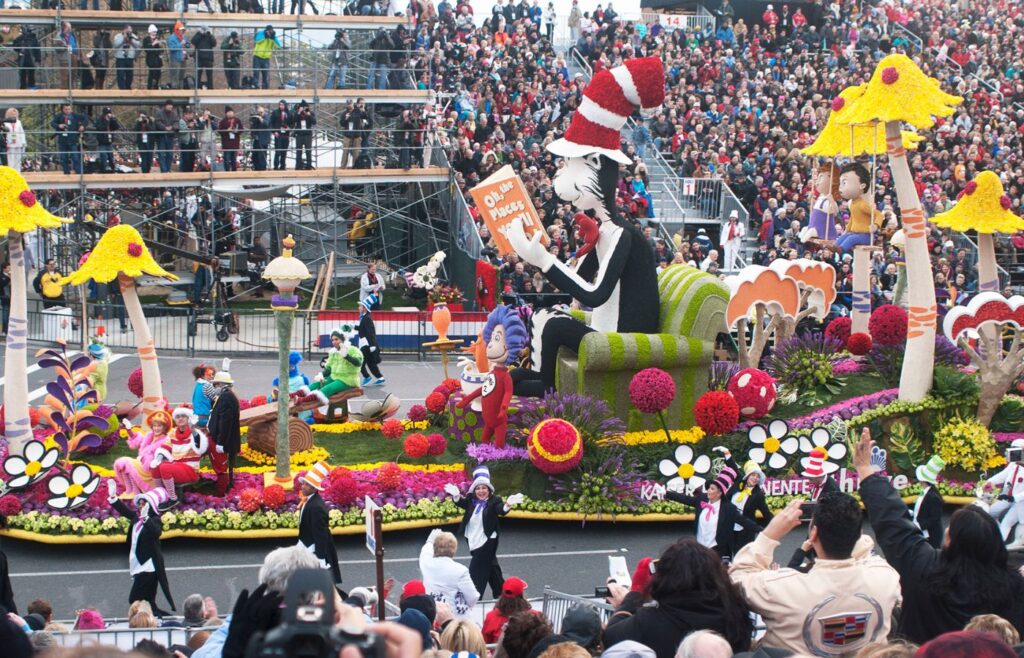
23. Strong winds almost ruined the Macy’s Thanksgiving Day Parade in 1997.
In 1997, strong winds caused the Barney balloon to be ripped along its abdomen. The Pink Panther balloon had to be stabbed by police in order to get it under control. And the Cat in the Hat struck a lamppost and then deflated to the ground.
Afterwards, organizers required all balloons to be no larger than 70 feet high, 78 feet long, and 40 feet wide.
24. About 50 million people watch the Macy’s Thanksgiving Day Parade annually.
Another 3.5 million attend it in person, and about 10,000 people participate in the parade.
If you want to watch it in person, you have to get there early. People start lining up as early as 6:30 a.m.!
25. Sonic the Hedgehog was the first video-game character featured in the Macy’s Thanksgiving Day Parade.
He first appeared in 1993.
26. Goku was the first Manga character to appear in a Macy’s Thanksgiving Day Parade.
Goku first appeared in 2018.
27. President Franklin D. Roosevelt tried to change the date of Thanksgiving.
In 1939, President Roosevelt decreed that Thanksgiving would be celebrated one week earlier to extend the Christmas shopping season.
His political opponents called it “Franksgiving”, and it was adopted by 23 states. Congress moved it back to the fourth Thursday in November in 1941.
28. “Jingle Bells” is actually a Thanksgiving song.
The song was composed by James Pierpoint in 1857 for children celebrating Thanksgiving. The title was originally “One Horse Open Sleigh.” The song quickly became associated with Christmas, and the title was officially changed in 1859.
29. The average number of calories consumed on Thanksgiving is 4,500.
30. The Butterball Turkey Hotline answers more than 100,000 turkey-cooking questions each holiday season.
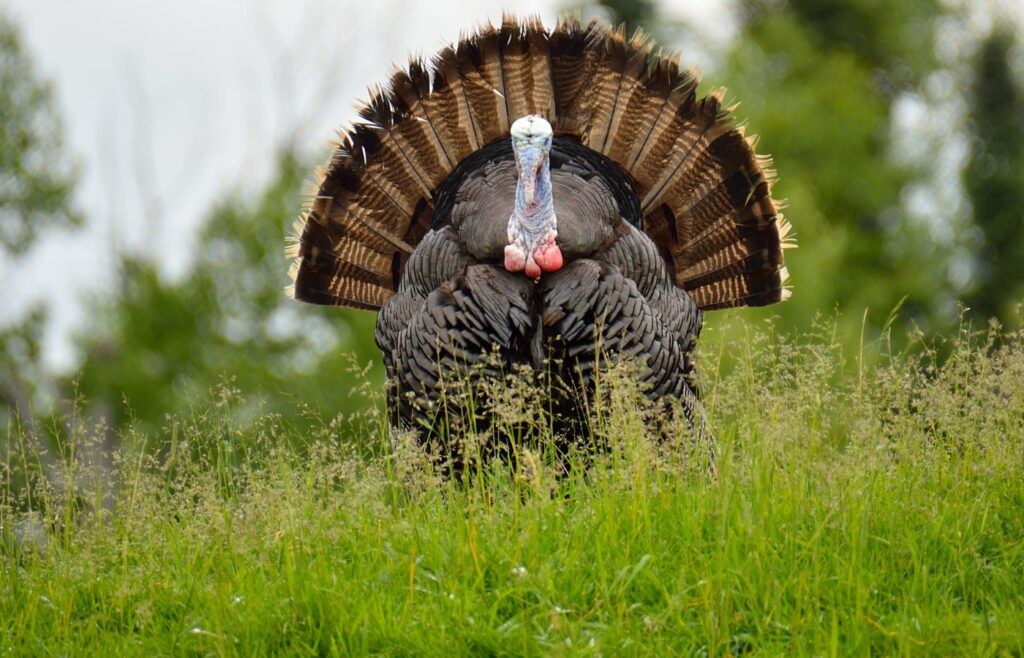
31. Benjamin Franklin wanted the turkey to be the U.S.A.’s national bird.
Franklin wrote a letter to his daughter that said, “I wish the bald eagle had not been chosen as the representative of our country; his is a bird of bad moral character.” Franklin thought the turkey was a “much more respectable bird.”
32. Legend has it that the town of Colchester in Connecticut postponed their Thanksgiving celebration for a week in 1705 because of a molasses shortage.
They needed their pumpkin pie! (Who can relate?)
33. Thomas Jefferson canceled Thanksgiving during his presidency.
Thomas Jefferson refused to declare days of Thanksgiving because he believed it was a day of prayer that went against a strong separation of church and state.
34. The day after Thanksgiving is the busiest day of the year for plumbers.
According to Roto-Rooter, the day after Thanksgiving is the busiest day of the year for plumbers. (Remember not to pour cooking oil down your drain!)
35. Minnesota produces the most turkeys of any U.S. state.
The state will produce around 40 million turkeys this year, according to the US Department of Agriculture.
The 450 turkey farms in the state are responsible for about 18 percent of all turkeys raised and sold in the United States yearly.
36. Americans eat 704 million pounds of turkey every Thanksgiving.
That’s more than 40 million turkeys served each year.

37. Calvin Coolidge was given a live raccoon for Thanksgiving.
In 1926, citizen Vinnie Joyce of Nitta Yuma, Mississippi sent President Calvin Coolidge was a live raccoon to eat on Thanksgiving. Instead, he and his wife Grace adopted the raccoon, named it Rebecca, and kept her as a White House pet.
38. Frozen had the biggest Thanksgiving opening of any movie.
The 2013 Disney animated musical Frozen is the No. 1 Thanksgiving release of all time, earning $93 million domestically.
39. Orlando is the most popular place to travel on Thanksgiving.
According to estimates by AAA, the most popular of destinations in 2019 were Orlando, Florida, Anaheim, California, then New York City.
40. Thanksgiving leftovers are more popular than the meal.
According to a 2015 Harris Poll, 81% of Americans prefer the leftovers of the Thanksgiving meal to the meal itself.
41. Turkey doesn’t make you sleepy.
It’s not the tryptophan that’s making you sluggish. It’s the giant meal you ate.
42. Turkeys are named after the country Turkey.
During the time of the Ottoman Empire, guinea fowl—birds that closely resemble turkeys—were often imported from their native North Africa to Europe. Because Europeans received them from Turkish traders, they called them turkey-hens.
When settlers from the Americas began sending what we call turkeys back to Europe, the Europeans began referring to them by the same name, because they looked so similar.
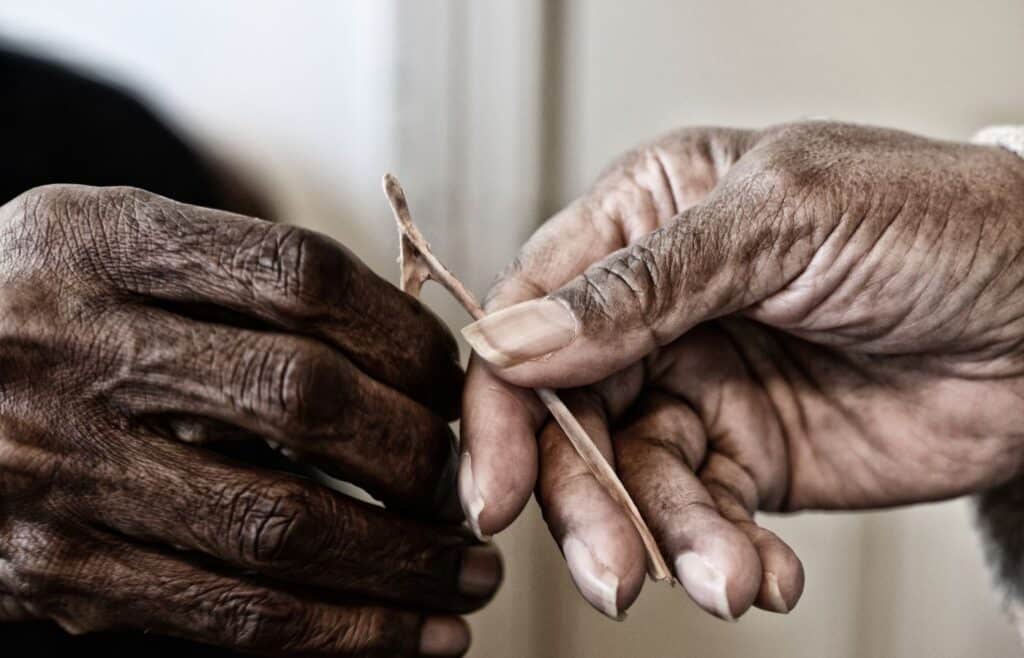
43. Cracking the wish bone is an ancient tradition.
Many people conclude Thanksgiving dinner by snapping the wish bone, with good luck being bestowed on the person with the bigger piece.
This practice traces back to the ancient Etruscans. They would dry their wishbones in the sun and keep them as good luck charms.
44. Thanksgiving is the second favorite holiday in the U.S.A.
According to Harris Poll from 2011, Thanksgiving is the second favorite holiday among American adults, behind Christmas and ahead of Halloween.
45. Female turkeys don’t gobble.
Only male turkeys — aptly named “gobblers” — actually make the sound. Female turkeys cackle.
46. The first turkey trot had only six runners.
The first turkey trot took place in 1896 at a YMCA in Buffalo, New York as an 8k race. It included just six runners, only four of whom made it to the finish line.
One runner dropped out when his “late breakfast refused to keep in its proper place” and another dropped out after two miles.
47. Over one million people complete a turkey trot each year.
Around 1,000 turkey trots take place around the country the morning of Thanksgiving.
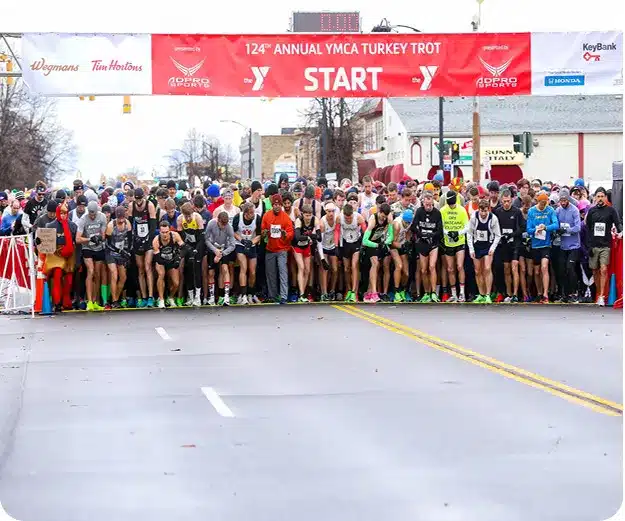
48. There are 34 cities named Plymouth in the U.S.A.
49. Americans eat an estimated 50 million pumpkin pies on Thanksgiving.
But according to the American Pie Council, it’s only the second favorite pie of Americans, losing out to apple pie.
50. Canadians celebrate Thanksgiving, too.
In Canada they celebrate Thanksgiving on the second Monday of October, a date closely linked to the harvest festival.
The British also increasingly embrace the American tradition to celebrate gratitude and national pride. They call it “Brits-giving”.
Frequently Asked Questions About Thanksgiving
When was the first Thanksgiving?
The first Thanksgiving was celebrated in Plymouth, Massachusettes in 1621 over a three day period. There was feasting, games, and military exercises. It lasted for three days. I likely occurred in late September or October as a harvest celebration.
Did they eat turkey at the first Thanksgiving?
There’s no record of a big giant turkey at the first Thanksgiving. Turkey may have been on the menu, but seafood would have been the main course at the first Thanksgiving. It’s also likely that other birds were eaten, such as ducks, geese and swans.
We wish you a very Happy Thanksgiving and a beautiful time celebrating with your friends and family.
Each Thanksgiving we remember that the history of this holiday is multi-layered and complicated.
For fifty years, indigenous people and their allies have gathered at noon on Cole’s Hill in Plymouth to commemorate a National Day of Mourning on the US Thanksgiving holiday.
Many Native people do not celebrate the arrival of the Pilgrims & other European settlers. Thanksgiving Day is a reminder of the genocide of millions of Native people and the erasure of Native cultures. Participants in National Day of Mourning honor Indigenous ancestors and Native resilience. It is a day of remembrance and spiritual connection, as well as a protest against the racism and oppression that Indigenous people continue to experience worldwide.
Related Posts:
Raising Grateful Kids in a Modern World
100 Fun Food Facts to Surprise your Kids
50 Mind-Blowing Mars Facts for Kids
